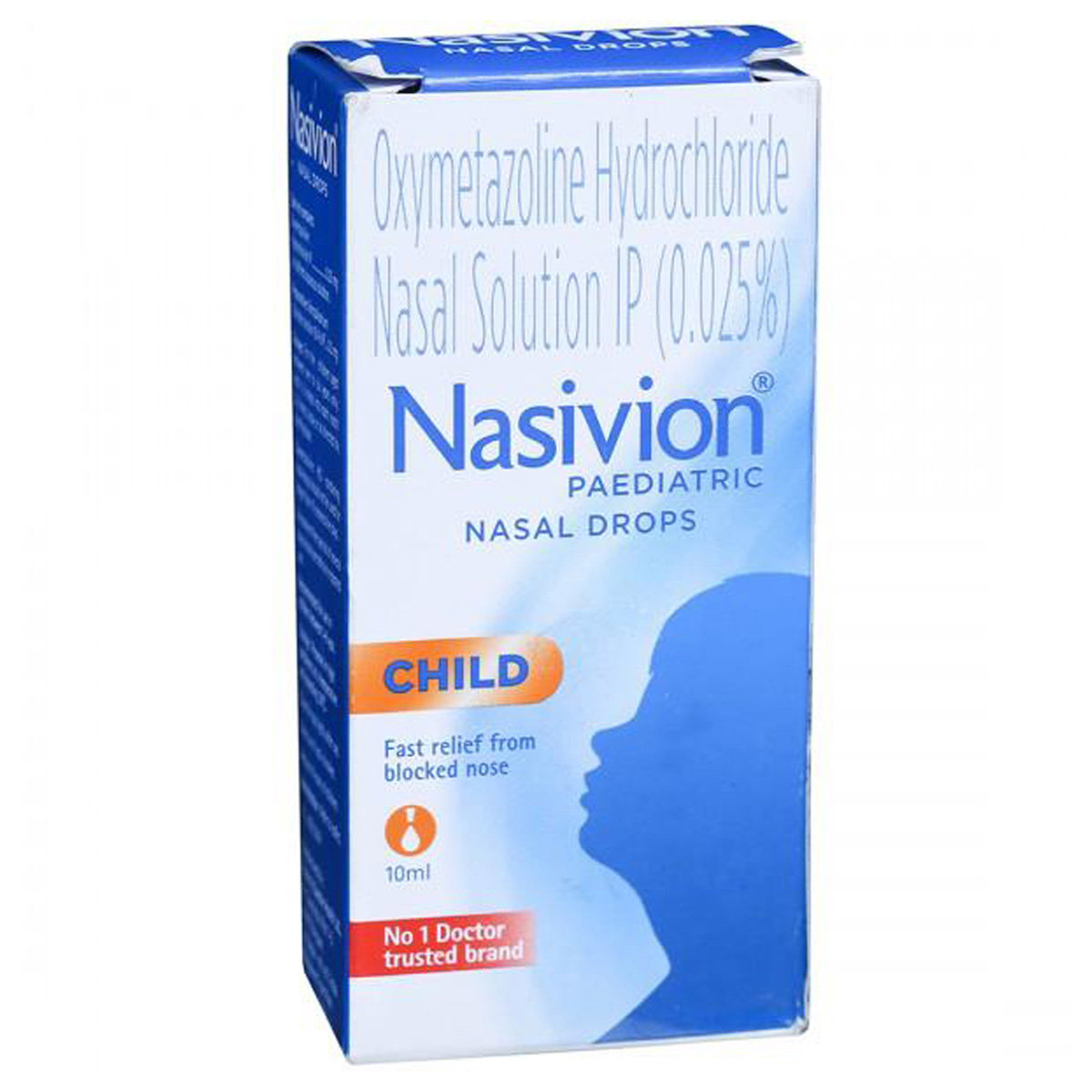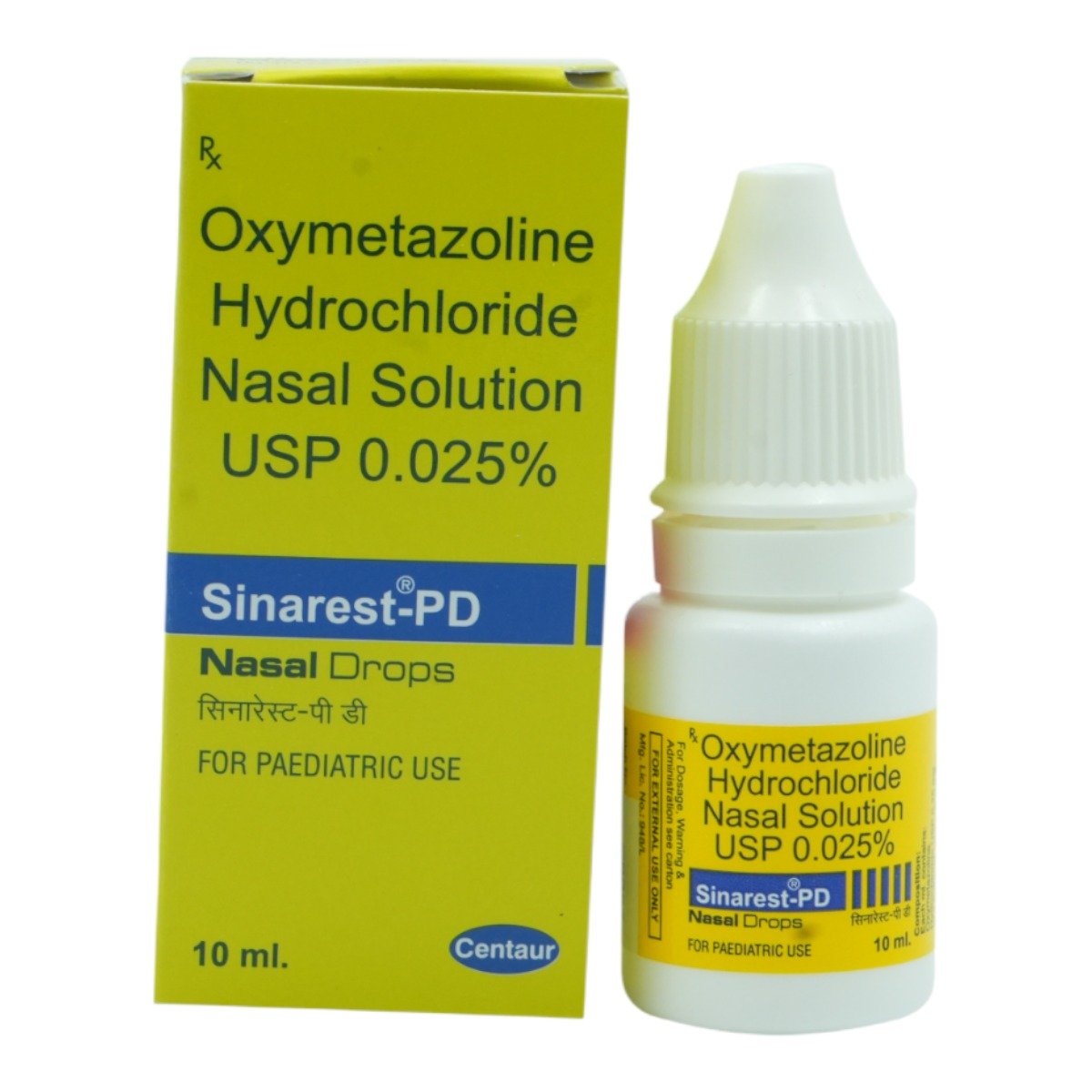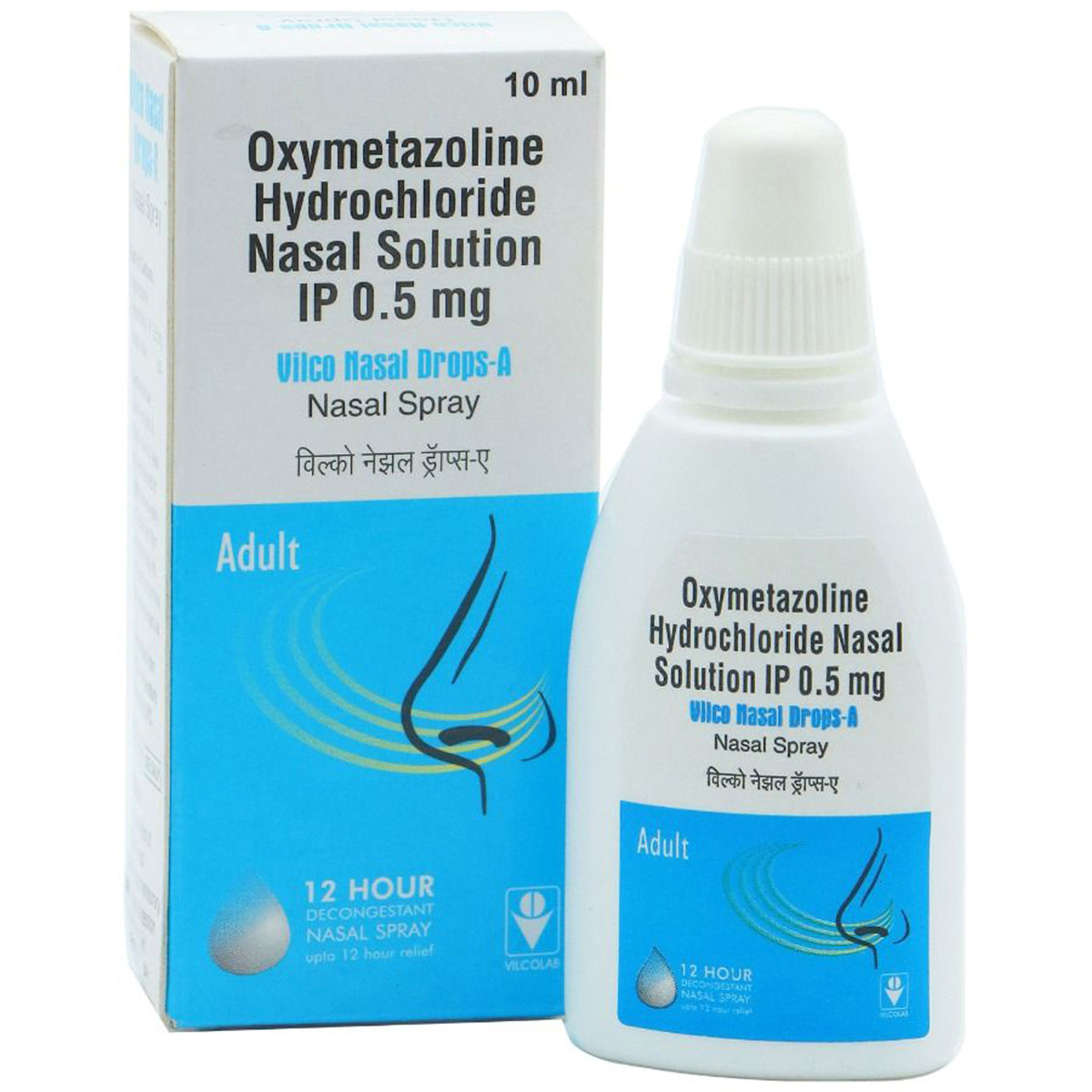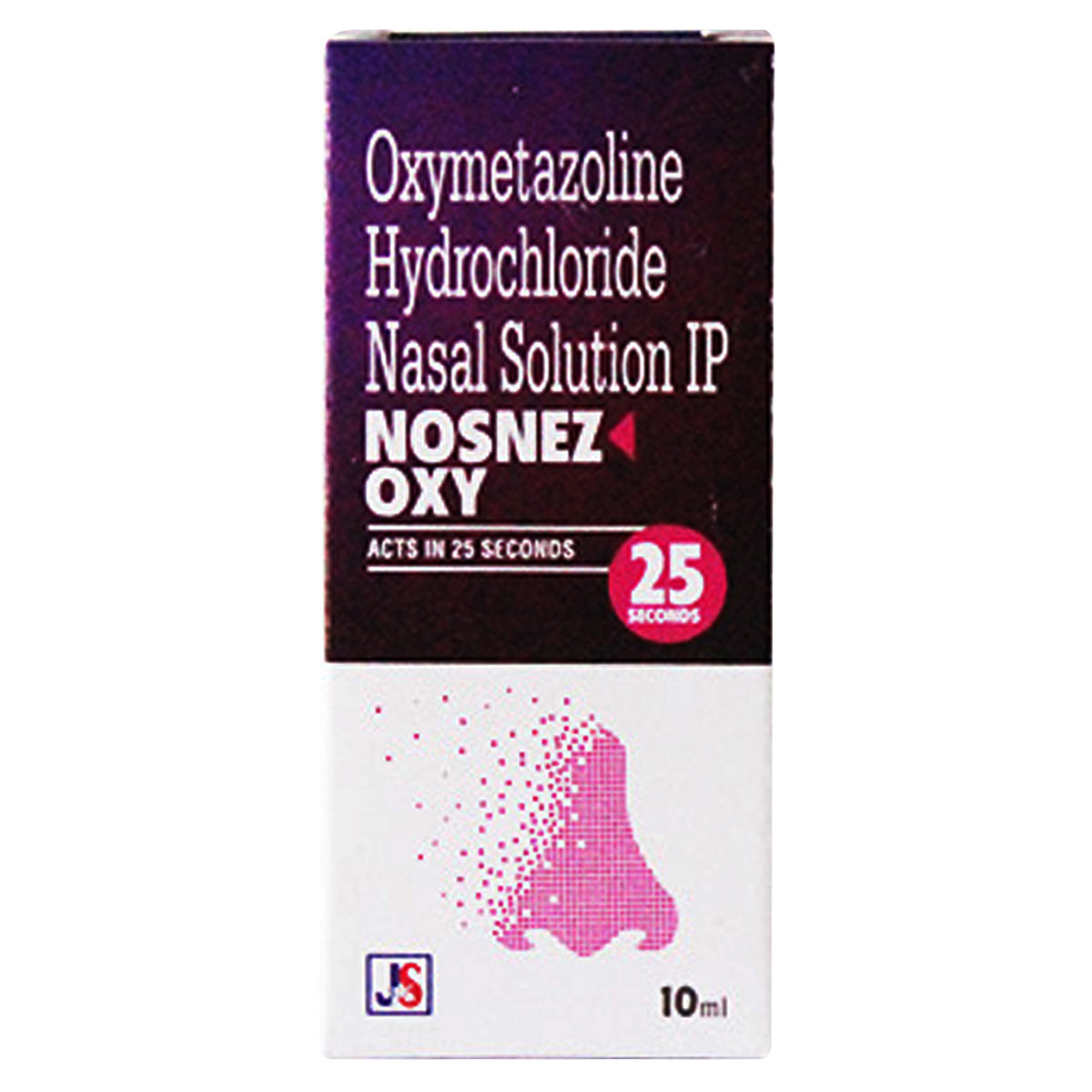Oxymetazoline Hydrochloride
About Oxymetazoline Hydrochloride
Oxymetazoline Hydrochloride is used to treat nasal congestion (stuffy nose) caused by hay fever (allergic rhinitis), common colds, flu, sinusitis, or other allergic conditions. Nasal congestion, also known as a stuffy nose, occurs when nasal passages become swollen with excess mucus and fluid.
Oxymetazoline Hydrochloride contains Oxymetazoline Hydrochloride, a nasal decongestant that works by contracting and narrowing the blood vessels in the linings of the nasal passages. Thus, Oxymetazoline Hydrochloride provides relief from congestion and decreases mucus production.
Some people may experience irritation/dryness of the nasal mucosa, local burning sensation, headache, and nausea. Most of these side effects do not require medical attention and resolve on their own over time. However, if the side effects persist or worsen, please consult your doctor.
Please tell your doctor if you are allergic to Oxymetazoline Hydrochloride or any other medicines. If you are pregnant or breastfeeding, inform your doctor before using the Oxymetazoline Hydrochloride. Avoid taking Oxymetazoline Hydrochloride if you have narrow-angle glaucoma or if you have undergone recent trans-nasal surgery.
Uses of Oxymetazoline Hydrochloride
• Relief of Nasal Congestion: Oxymetazoline Hydrochloride temporarily relieves nasal congestion due to the common cold, hay fever, or other upper respiratory allergies.
• Relief of Sinus Congestion and Pressure: Oxymetazoline Hydrochloride temporarily relieves sinus congestion and pressure associated with sinusitis.
• Reduction of Nasal Swelling: Oxymetazoline Hydrochloride shrinks swollen nasal membranes, allowing for freer breathing through the nose.
Medicinal Benefits
- Oxymetazoline Hydrochloride contains Oxymetazoline hydrochloride, which helps relieve nasal congestion caused by colds, allergies, or sinus infections.
- It works by narrowing the blood vessels in the nasal passages, which reduces swelling and mucus production.
- It helps clear nasal blockage and allows for easier breathing.
- Oxymetazoline Hydrochloride acts within minutes, providing quick relief from congestion.
- It offers long-lasting relief for up to 12 hours, ensuring comfortable breathing throughout the day or night.
Directions for Use
- Follow your doctor's instructions on the dosage and timing of this medication to ensure safe and effective use.
- Tilt your head back and instil the drops in your nostrils. Stay in that position for a few seconds to allow the drops to spread. Repeat the same process for the other nostril if necessary.
- Avoid sneezing or blowing your nose for at least a few minutes after using the drops.
- Avoid touching the dropper tip to prevent contamination.
Storage
Side Effects of Oxymetazoline Hydrochloride
- Irritation or dryness of the nasal mucosa (tissue lining the nasal cavity)
- Local burning sensation
- Headache
- Nausea
Drug Warnings
- Please tell your doctor if you are allergic to Oxymetazoline Hydrochloride or any other medicines.
- Avoid using Oxymetazoline Hydrochloride if you have narrow-angle glaucoma or if you have undergone recent trans-nasal surgery.
- If you are pregnant or breastfeeding, inform your doctor before using Oxymetazoline Hydrochloride.
- Oxymetazoline Hydrochloride should be used in children only if advised by a doctor.
- If you have diabetes, high blood pressure, hyperthyroidism or heart disease, inform your doctor before using Oxymetazoline Hydrochloride.
- Avoid sharing Oxymetazoline Hydrochloride with other people to prevent the spread of infection.
Drug Interactions
Drug-Drug Interactions: Oxymetazoline Hydrochloride may interact with antidepressants (imipramine, desipramine, amitriptyline), ergot alkaloids (ergonovine, dihydroergotamine, ergotamine) and MAO inhibitors (linezolid, selegiline, tranylcypromine).
Drug-Food Interactions: Oxymetazoline Hydrochloride may interact with caffeine. Therefore, avoid or limit the intake of caffeine (such as chocolate, tea, coffee, colas, and some herbal supplements), as it may increase the risk of adverse effects, including sleep problems, rapid heartbeat, nervousness, nausea, or tremors.
Drug-Disease Interactions: If you have diabetes, high blood pressure, hyperthyroidism, an enlarged prostate gland, narrow-angle glaucoma or heart disease, inform your doctor before taking Oxymetazoline Hydrochloride.
Drug-Drug Interactions Checker List:
Safety Advice
Alcohol
cautionOxymetazoline Hydrochloride may cause dizziness. Therefore, limit alcohol consumption while using Oxymetazoline Hydrochloride.
Pregnancy
cautionPlease consult your doctor if you are pregnant. Your doctor will weigh the benefits and potential risks before prescribing Oxymetazoline Hydrochloride.
Breast Feeding
cautionPlease consult your doctor if you are breastfeeding. Your doctor will weigh the benefits and potential risks before prescribing Oxymetazoline Hydrochloride.
Driving
safeOxymetazoline Hydrochloride usually does not affect your ability to drive or operate machinery.
Liver
consult your doctorInform your doctor if you have any history of liver problems before using Oxymetazoline Hydrochloride.
Kidney
consult your doctorInform your doctor if you have any history of kidney problems before using Oxymetazoline Hydrochloride.
Children
safe if prescribedOxymetazoline Hydrochloride should be used in children only if prescribed by the doctor.
Habit Forming
Diet & Lifestyle Advise
- Add ginger to foods or tea as it contains some anti-inflammatory compounds that can relax membranes in the airways and reduce cough, irritation and swelling in the nasal passages.
- Drink liquids at room temperature to relieve a runny nose, cough, and sneezing.
- Practice meditation, deep breathing, regular exercise, and try progressive muscle relaxation techniques to find relief from stress.
- It is advised to avoid contact with known allergens (allergy-causing agents) such as pollen, dust, etc.
- Maintain personal hygiene and keep your surroundings clean.
Special Advise
You are recommended to remove nasal fluids before using Oxymetazoline Hydrochloride by blowing the nose.
Patients Concern
Disease/Condition Glossary
Nasal congestion: Nasal congestion is also known as a stuffy nose that occurs when the nasal passages become swollen with excess mucus and fluid. Nasal congestion may be caused by hay fever, allergies, nasal polyps (non-cancerous growths) or benign tumours in the nasal passages, environmental irritants or a long-lasting sinus infection. It may also be triggered by tobacco smoke, perfume or an infection.
FAQs
Oxymetazoline Hydrochloride belongs to the class of medications called nasal decongestants, primarily used to treat nasal congestion (stuffy nose) caused by hay fever (allergic rhinitis), common colds, flu, sinusitis, or other allergic conditions.
Oxymetazoline Hydrochloride constricts the blood vessels and reduces the blood flow to the affected area. Thereby, it provides relief from inflammation and reduces the symptoms.
Oxymetazoline Hydrochloride may cause a recurrence of symptoms when used for a long time. Therefore, it is not recommended for use for more than seven days. If the symptoms do not improve within seven days, contact your doctor.
Oxymetazoline Hydrochloride may cause an increase in blood pressure. Therefore, it should be used with caution in patients with hypertension (high blood pressure). Inform your doctor if you have high blood pressure before starting Oxymetazoline Hydrochloride.
Oxymetazoline Hydrochloride should not be taken with antidepressants. Antidepressants can increase the effect of Oxymetazoline Hydrochloride and cause high blood pressure. Do not take Oxymetazoline Hydrochloride if you take monoamine oxidase inhibitors (for depression) or have taken them in the last 14 days.







